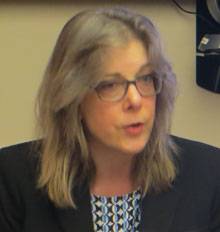
New York, NY—On May 19, 2014, Kimberly Marten, Olin Professor of Political Science at Barnard College and Deputy Director for Development at Columbia University’s Harriman Institute for Russian, Eurasian, and East European Studies, spoke to the WFPG on “Russia and Ukraine: Past, Present, and Future.” Marten discussed the historical and regional context of the current conflict as well as the future of Crimea and eastern Ukraine, the upcoming elections, internal turmoil in Ukraine, and the response from the West. The discussion was moderated by WFPG President Patricia Ellis and cosponsored by the Institute of International Education.
Marten outlined the regional history that created a Ukraine that has never been definitively controlled by Russia or the West. The western regions of Ukraine historically fell under the Austro-Hungarian and Polish-Lithuanian Empires’ spheres of influence, while the east fell into that of the Russian Empire. Marten argues that the best future for Ukraine is one in which it does not have to choose between Russia and the West but can act as a bridge between the two.
Marten also addressed the current state of turmoil within Ukraine. In her view, Putin’s interference is not the only problem facing the country. Other challenges include: corruption, oligarchic political institutions, unreliable military and police forces, a shattered economy, and emerging warlordism. Warlordism in particular adds to chaos in the region, as the warlords have no political agenda and are concerned only with their own gain. In addition, the IMF announced that should Ukraine lose the east, it would reconsider the terms of its current bailout agreement with Ukraine. Given all of this internal turmoil, Marten predicts that Ukraine is far from both EU and NATO membership.
Marten also discussed Putin’s motivations for invading Crimea, which she believes did not contribute to the security of ethnic Russians or to Russia’s economic prospects. The acquisition of Crimea was expensive and until it is internationally recognized, an unlikely eventuality in Marten’s mind, Putin will not have access to the oil reserves in the region and companies will be hesitant to invest there. Putin’s motivations are closely linked to the goals of oligarchs, such as Vladimir Yakunin and others closely tied to the Russian Orthodox Church who are committed to the protection of conservative, ethnic Russians. Marten spoke about the importance of Putin’s shift in language from referring to the Russian state and citizens, as he has always done, to routinely referring to the Russian ethnicity. While she anticipates that Russian involvement in eastern Ukraine will dwindle, she does not foresee Putin surrendering Crimea, as the takeover is his way of defining his historic legacy.
According to Marten, the US and European sanctions against Russia have had an impact, by checking Putin and harming the Russian economy, especially in the energy sector, despite the recent energy deal between China and Russia. She defended President Obama’s actions, noting that his hands are effectively tied, as he cannot move for harsher sanctions without his European allies, who are hesitant to increase sanctions given the intertwined Russian and European economies. In terms of possible expansion into other nations in the region, NATO membership will protect countries such as Latvia and Estonia, while sanctions combined with Putin’s ostracism will likely deter him from expanding into non-NATO states such as Moldova.